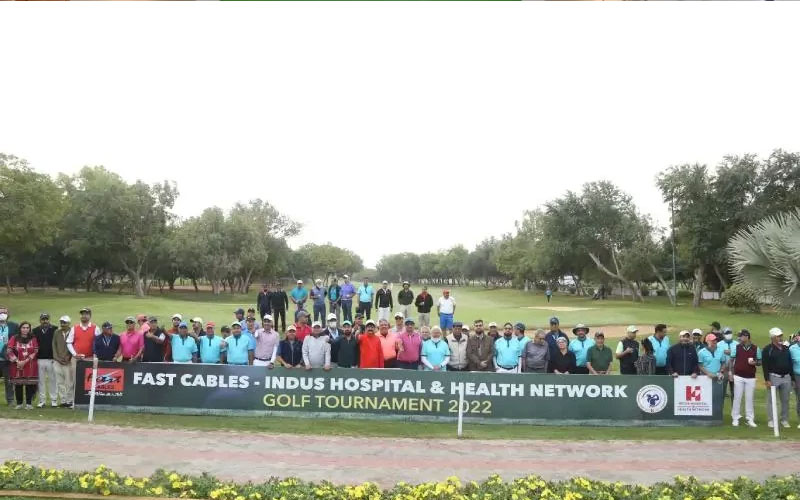TEE OFF TO SAVE THOUSANDS OF CHILDREN STRUGGLING FOR LIFE
The Indus Hospital & Health Network (IHHN) partnered with Pakistan’s leading and most trusted electrical cable manufacturer, Fast Cables to host an exciting fundraising event that offered a thrilling game of golf for the distinguished players participating. IHHN organized the seventh Golf tournament on February 6, 2022, at the Karachi Golf Club. Shahbaz Yasin Malik, President, and Chief Executive Officer, Hilton Pharma, was the Chief Guest. Kamal Amjad Mian, Director Fast Cables; Dr. Abdul Bari Khan, Chief Executive Officer, IHHN; Dr. Muhammad Fareeduddin, Chair, Pediatric Services, IHHN; and Syed Mashhood Rizvi, Executive Director, IHHN were also present at the event.
Teams of 4 balls competed in a Texas Scramble Format. One hundred thirty-six players participated in the tournament. The Winners of the Golf Match, with a 54.3 Net, were Nadeem Iftikhar; Faisal Mukaty; Muhammad Qasim; and Hamza Ghani.
The Runner-ups, with a 54.8 Net, were Fahad Ishtiaq; Bilal Shaukat; Rizwan Merchant; and Rahim Amin.
With a 55.9 Net, the Second Runner-Ups were Bilal Rafi Muneer; Mujtaba Bilal; Omer Bayat; and Commodore Abdul Rehman.
Dr. Muhammad Fareeduddin, Chair of Pediatric Services, IHHN, provided an overview of IHHN’s Pediatric services.
“At the Indus Hospital & Health Network, Korangi Campus, we have approximately 135 dedicated beds for pediatric patients. All pediatric services are being provided except pediatric neurosurgery and pediatric cardiac surgery. We are catering to nearly 1,200 patients daily at the Korangi Campus alone. Once the new hospital building is completed, we expect to receive about 4,000-5,000 pediatric patients daily.”
In his thank-you note, Dr. Bari said, Indus Hospital & Health Network has been working to improve the country’s health indicators for the last 14 years. He lauded Dr. Fareeduddin’s extensive work in pediatrics and discussed the capacity-building efforts of IHNN. In addition, he expressed his desire to see the new hospital building in Korangi being completed that will further help in serving the people of Pakistan.
While speaking at the event, Shahbaz Yasin Malik said, “IHHN is providing a great service that is immeasurable. It is a terrific effort that is saving the lives of the people of Pakistan. I thank everyone for their kind support and generosity supporting IHHN.”
Kamal Amjad Mian, Director Fast Cables, distributed the prizes among the winners. Abdul Karim Paracha, Chairman, Board of Directors, IHHN, gave a vote of thanks.
The event was very well-participated. It provided an opportunity for corporate leaders to showcase their commitment to IHHN’s cause. Business heads and other dignitaries participated in the tournament. Media Partner ARY Network covered the event.
The objectives of organizing the Golf tournament were to promote healthy activities; to create awareness about the work of IHHN amongst the golfing community; to provide a networking opportunity to the golfing community; and raise funds for pediatric services.
The annual Golf Tournament is Indus Hospital & Health Network’s flagship sports event started in 2016. The annual event has earned a significant position in the corporate sector and golfing community. After successfully holding the event in Karachi, IHHN organized the first tournament in Lahore in 2020. In 2022, IHHN will be holding its first Golf tournament in Islamabad. The International Partners of IHHN have also organized three tournaments in the UK and one in Canada.
This year, in Karachi, IHHN will be rallying the golfers to raise funds for Pediatric Cardiology; Pediatric Physical Rehabilitation; and Cochlear Implants.
IHHN started pediatric cardiology services in 2011. The Pediatric Cardiology service caters to infants and children with heart and blood vessel diseases. IHHN’s qualified team of cardiologists performs all the necessary assessments, diagnoses, and treatment. So far, IHHN has treated 362 children, with 250 children benefitting from cardiac catheter services annually. After expanding the Korangi Campus, the hospital will start surgical services.
Indus has been offering free Cochlear Implant services since 2014. The program is managed by a team of speech and language therapists, audiologists, and psychologists to address the child’s developmental needs once the ENT team has placed the implant. One hundred one children have received Cochlear Implants to date.
The Physical Rehabilitation services for children are dedicated to enhancing and restoring functional ability and quality of life to children with acquired or congenital physical impairments or disabilities affecting the brain, spinal cord, nerves, bones, joints, ligaments, muscles, and tendons. So far, 3,736 pediatric patients have benefitted from the physical Rehabilitation services, while 6,587 have been fitted with devices.
About Fast Cables
Since its inception in 1985, Fast Cables Limited has emerged as Pakistan’s leading and most trusted electrical cable manufacturer. At Fast Cables, quality is our first priority, combined with superior customer service and affordability. Our emphasis on quality has made Fast Cables one of the most reliable brands in the Cable Industry of Pakistan and the choice of leading electrical consultants, engineers, and architects in the country.
About Indus Hospital & Health Network
Initiated by a group of professionals with the support of some philanthropists and businesspeople, in 2007, The Indus Hospital started its journey with a purpose to provide indiscriminate, quality healthcare to all in a state-of-the-art, paperless, 150-bed hospital in Korangi, Karachi.
The Hospital has now evolved into the Indus Hospital & Health Network, managing 13 hospitals across Pakistan. The Network also has a country-wide network of primary care clinics and outreach programs. The Indus Hospital, Korangi Campus, Karachi, is being expanded to a 1,350-bed facility.
At the same time, the Indus Hospital & Health Network — QF, NST & SMP Campus, a state-of-the-art 600-bed tertiary care hospital, has opened its doors in Lahore. Both hospitals are associated with the Indus University of Health Sciences.
The hi-tech blood center of IHHN has four regional blood centers in Multan, Bahawalpur, Jamshoro, and Karachi. IHHN runs four physical and rehabilitation centers in Karachi, Lahore, Muzaffargarh, and Badin. The Network also has six international partners — in USA, UK, UAE, Australia, Switzerland, and Canada.




